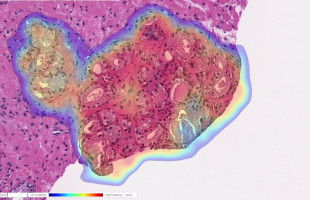
A novel targeted radionuclide alpha therapy for metastatic castration-resistant prostate cancer—225AC-NM600—has been shown to achieve significantly better outcomes than its corresponding targeted radionuclide beta therapy.
Presented at the Society of Nuclear Medicine and Molecular Imaging 2022 Annual Meeting, these results demonstrate the potential of 225AC-NM600 for the treatment of advanced-stage prostate cancer patients.
“Metastatic castration-resistance prostate cancer is the most lethal form of the disease and has a median life expectancy of less than five years. Innovative targeted therapies to treat this advanced form of cancer are needed to significantly improve survival,” said Carolina Ferreira, PhD, a research associate at the University of Wisconsin-Madison in Madison, Wisconsin.
Knowing that prostate cancer cells selectively sequester and retain alkylphospholipds through lipid rafts, Ferreira and colleagues developed an analog—NM600—to target prostate cancer cells.
This analog was paired with alpha-emitting (225Ac) and beta-emitting (177Lu) isotopes to create two types of targeted radionuclide therapies.
The effectiveness of these two therapies was then compared in two syngeneic mice models of prostate cancer.
In the study, PET/CT scans were performed to image mice with two types of prostate cancer tumours, then the animals were treated with varying doses of 225Ac-NM600 or 177Lu-NM600 or received a control.
Radiotracer uptake was measured, and ex vivo biodistribution studies were performed.
Tumour progression and animal survival were monitored, and radiotoxicity was evaluated.
Targeted radionuclide therapy with an alpha-emitter (225Ac-NM600) produced significantly better outcomes, such as slowed tumour growth and improved overall survival, than therapy with a beta-emitter (177Lu-NM600) at similar doses in both tumour models.
Both treatments were well tolerated by the mice.
“This study shows that targeted radionuclide therapies with alpha- and beta-emitters have distinctive, often unexpected, effects on the tumour microenvironment,” noted Ferreira. “Careful exploration of combination regimens, such as targeted radionuclide therapies with anti-tumour vaccines or checkpoint blockade, is warranted.”